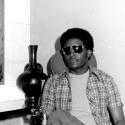A great wall of noise greets the audience as it settles in to the Royal Festival Hall - the sound of some heavy outer planet’s radio frequency, a subtly oscillating drone that recalls NASA’s recordings of radio emissions from Saturn made by the Cassini spacecraft. Lou Reed’s work station for the night is set centre-stage, behind a rack of electronic machinery, a row of guitars awaiting their signal stacked behind him, but for 20 minutes or so there’s just that continuum of noise – in fact the sound of three guitars leant up against a stack of live amps. Is this to soften up the audience’s collective eardrums and gut responses, or simply to clear the air of all the iconic clutter that comes with being Lou Reed?
His Metal Machine Trio – Reed on guitars and amps, Ulrich Krieger on saxophone, Sarth Calhoun on laptops – promise a “night of deep noise” which draws its inspiration from Reed’s 1975 double album that, notoriously, became the most returned album in rock history. Not that it had anything much to do with rock. Given that it appeared at a time when Chrysalis released Stockhausen’s Aus Den Sieben Tagen – his epic set of “intuitive music” – it’s almost surprising that Metal Machine Music created such a furore. As many critics have testified on receipt of the new, remastered release of the original album on Reed’s own Sister Ray label, it’s a lot more listenable – given a certain frame of mind – than its reputation suggests.
When they finally appear, the trio face the audience before taking up position – Calhoun at his laptops, Krieger before a mighty gong that he beats into a ouija, table-tapping pulse reminiscient of Popul Vuh’s In Den Garten Pharaos, while Reed makes his way to the stack of amps at the back of the stage as a hirsute assistant scurries behind him armed with gaffer tape. Reed sets about various unseen operations, flicks his fingers over the strings of one of the guitars leant up against the amps, then slowly heads centre stage, choosing a guitar and leaning into it to make it cry. The sound is physically overwhelming.
A flock of high, arc-welding high notes travelling at Gulf Stream speeds leads into a beautifully ambient, meditative phase in this evening of deep noise. With a jerk of his thumb, Reed sends his assistant scurrying back to silence the opening drone as his own feedback bleeds into a metallic duet with Krieger’s demented, fractal sax lines. Another hand signal sees Krieger exchange his sax for the giant timpani, upon which he beats out a ritualistic rhythm as Reed gazes intently into his instrument panel.
Bathed in a cadaverous blue stage light, his movements become jerky and insect-like, he looks like a figure stalking the sets of Dr Caligari, with half the frames of the film removed, raising up music from pure signal. The sound reminds you of William Burroughs’ Soft Machine-era imagery of rotten, farting metal excreta, with Reed massaging great low reverberating tones that hit you like an elbow in the colon.
After around an hour, touchdown approaches; Krieger and Calhoun are directed to the gong and timpani, while Reed’s assistant switches the rear-stage stack of amps back to life to return us to the evening’s opening drone. The man is virtually a fourth member of the group, for his administrations seem crucial to Reed’s execution of sound.
It is Reed himself who brings the deep noise back down to radio silence with a violent lashing of the gong that belies the physical frailty of his appearance. It’s not music in any conventional sense, but it is powerful and beautiful, compelling enough to stay with you long afterwards, bleeding through into the incidental noises of life – trains, traffic, the busy urban harmonics we’re all acclimatised to. And what better soundtrack is there to mark the temporary absence of planes from airspace, or the metallic waste of volcanic eruption colouring the evening sky?
When it is finished, the trio receive a slow-burn of applause followed by a standing ovation – proof positive that in these poptastic times of celebrity tunnel-vision there is still elbow room for the experimental, the wilful, the avant-garde. Reed, looking worn-through but triumphant, saluting his audience, even pausing to sign someone’s proffered Lou Reed Live LP, and extending his hand to a line of fans jostling below him for an absolving touch, as if to say, in acknowledgement: “You’ve been through it; I’ve been through it, too.”
Listen to Metal Machine Music on YouTube















Add comment